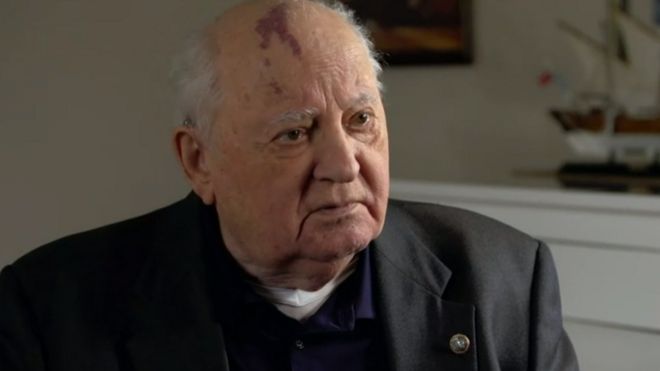
Mikhail Gorbachev (Soviet Union, 1931) is credited with
many of the changes in Eastern Europe that ended with the demolition of the
Berlin Wall, the reunification of Germany, the disintegration of the USSR and
the end of the Cold War.
Now, days after the anniversary of one of its most recognizable
symbols, who was the general secretary of the Soviet Communist Party spoke to
the BBC.
And he
called on all countries to end the "nuclear arms race".
"As
long as there are weapons of mass destruction, especially nuclear weapons, (the
world) is facing a colossal danger", the latest Soviet leader told BBC
journalist Steve Rosenberg in Moscow.
"All
nations must destroy all nuclear weapons. It is necessary to save ourselves and
our planet", gorbachev, 88, argued.
"Still at war"
One of
Gorbachev's great achievements was to end the nuclear arms rivalry between the
USSR and the United States.
In 1987 he signed with then-White House tenant Ronald
Reagan, the Intermediate Range Nuclear Forces (INF) treaty, and both countries
pledged to reduce their respective arsenals.
But the commitment failed decades later.
On August 2, the Russian and US governments formally
withdrew from the treaty.
Asked
how he sees the current relations between Russia and the West, three decades
after the end of the Cold War, Gorbachev described them as "cold, but
still at war".
"You have to look at what's going on. In different
parts of the world there are skirmishes, clashes. Planes and combat ships are
sent here and there. This is not the situation we want", Gorbachev mused.
"We decided not to interfere"
On 9 November 1989, the Berlin Wall fell, leading to the
reunification of the Federal Republic and the Democratic Republic of Germany,
divided from the end of World War II.
In the face of this, the USSR decided not to intervene,
Gorbachev recalled.
"There couldn't be a massacre. We could not allow
that, on an issue of such magnitude for Germany, for us, for Europe, for
everyone. That's why we decided not to interfere", he explained.
Now, when asked what steps should be taken for the UK's
exit from the European Union, Brexit, he also preferred to stay out of it.
"It's something the British have to solve
for themselves. They're smart guys. I won't give any advice. They decide",
he concluded.
SOURCE: BBC
